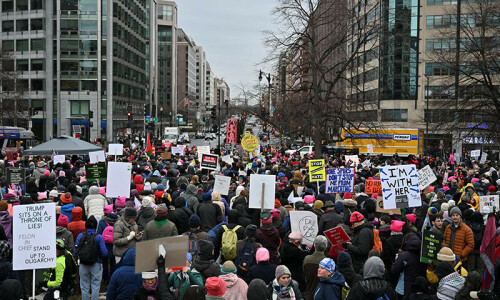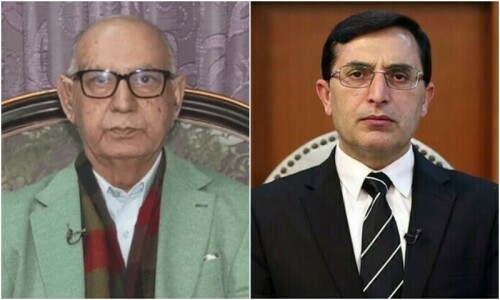WHILE all are equal before the law, the quality of judgements and the judicial reasoning offered in important cases, especially in those that are precedent-setting, ought to be unimpeachable and of the highest order.
A year since Nawaz Sharif was stripped of the prime ministership by the Supreme Court and nearly five months since he was barred from holding party office, the legal controversy over those two judgements, at least in independent legal circles, has not abated.
While the Supreme Court’s verdicts are binding and presumably irreversible and Mr Sharif has abided by the judgements against him in the highest court of the land, there continues to be confusion and uncertainty about the applicability of the disqualification criteria against those seeking elected office.
It had been hoped that a trial in a NAB court, where rules of procedure and evidence must be adhered to, and the prosecution and defence can put their best case forward, would dispel some of the lingering uncertainty about proof of crimes committed by Mr Sharif and his family.
Worryingly, early assessments of the NAB judgement suggest that rather than a water-tight and irrefutable case of corruption against Mr Sharif having been assembled by the prosecution, it was a presumption of corruption against Mr Sharif that his defence was unable to adequately refute that is the reason for the handing down of a lengthy jail sentence.
Certainly, from a political perspective, the Sharif family’s inability to provide a credible explanation for the vast wealth and assets under family control is deeply damaging. The old ways of politics as a business need to be shed by the political class.
Yet, a significant opportunity appears to have been missed by the state.
More than two years have elapsed since the publication of the Panama Papers, a lengthy Supreme Court process was completed last year, and a trial that is many months old will continue in the NAB court.
Surely, to set a meaningful precedent that will strengthen the democratic project, the state ought to have unearthed and presented in the trial court irrefutable and compelling evidence of criminal conduct and financial misconduct by the Sharifs.
The inability of the state prosecution to demonstrate beyond reasonable doubt the means through which the Sharif family acquired the London apartments will likely continue to leave the accountability process against the Sharifs open to accusations of political motivations.
That, it should be clear, would be a disservice to the cause of transparent, impartial and non-partisan accountability.
If the cycle of politicians accused of corruption making a political comeback at a later date is to be left behind, the accountability process must be impeccable and beyond all credible allegations of partisanship.
Can it really be said that the legal process against Mr Sharif has thus far laid down good law and precedent that will survive the test of time?
Published in Dawn, July 8th, 2018













































